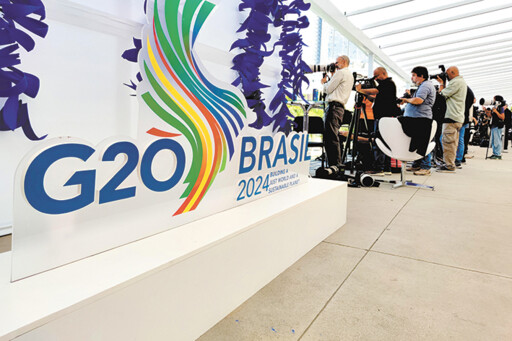


G20 Rio summit heralds bigger role of Global South

Journalists take pictures during the 19th G20 Summit in Rio de Janerio, Brazil. Photo: IC PHOTO
The recently concluded 19th G20 Summit, held in Rio de Janerio, Brazil, under the theme of “Building a Just World and a Sustainable Planet,” again placed the group’s member states from the Global South in the spotlight of the international arena. With their unique perspectives, pressing needs, historical experiences, and collective wisdom, Global South countries have been contributing their respective strength to dialogue and cooperation for global economic reform and recovery.
To delve deeper into the Global South’s role in the G20 summit, as well as key issues like global governance reform and eliminating hunger and poverty, CSST recently interviewed José Medeiros da Silva, a professor of Portuguese and director of the center for Brazilian studies at Zhejiang International Studies University; Nnanda Kizito, a senior research fellow and head of the Development Watch Center in Uganda; and Robert Walker, a professor emeritus of the Green Templeton College at the University of Oxford and also professor from the Jingshi Academy at Beijing Normal University.
Pivotal role of Global South
Tracing the development trajectory of the G20, da Silva told CSST that the economic crisis in certain Asian economies at the end of the 20th century was a key factor in the group’s emergence. Similarly, the financial crisis of 2007 and 2008 in Europe and the United States was pivotal in elevating the G20’s political prominence.
“For me, the G20 as we know it today is the result of a combination of two main factors. On the one hand, the rich countries, members of the G7, realized their inability to face the economic crises and problems of global governance alone. On the other hand, the geo-economic prominence of the emerging countries was also being transformed into international political prominence,” da Silva articulated. “I would venture to say that the emerging countries of the Global South are the driving force behind the G20 and the reason for its existence. It is these countries that unequivocally point out the most urgent and profound priorities for more equitable global governance that promotes common prosperity.”
Kizito emphasized that the recent succession of G20 presidencies has strategically created an opportunity for the Global South to shape the global agenda in favor of developing countries’ priorities. Indonesia, India, and Brazil have all demonstrated a commitment to sustainable development, economic resilience, and inclusive growth, which align with the needs of many developing nations. By prioritizing issues such as food security, climate finance, equitable access to technology, and debt relief, the G20 can address specific challenges faced by the Global South.
“I also think that South Africa’s upcoming presidency may further emphasize social inequality and infrastructure development, enhancing the developmental focus for our countries in Africa and other Global South countries,” Kizito predicted. “Also, the continuity of Global South leadership allows our countries to build on each other’s efforts, creating lasting frameworks for cooperation among developing countries.”
Kizito added that various initiatives and collaborative platforms can be expanded to bring together diverse partners from the Global South, fostering new trade routes, technical exchanges, and joint projects. “I believe that these efforts not only encourage South-South cooperation but also reduce dependency on traditional aid from the Global North, helping developing countries to build autonomous, sustainable economies.”
Global governance reform
Global governance reform topped the agenda of the G20 Rio summit. Kizito observed that leaders from the Global South are increasingly calling for a multipolar world order, where decision-making power is distributed more equitably. He believes that a continued Global South-led G20 will further offer a platform to push for reforms in international institutions like the United Nations, International Monetary Fund, and World Bank, ensuring they better represent the current global power dynamics.
Kizito expressed his hope that the G20, under the stewardship of countries like China, Brazil, and South Africa, will elevate discussions on giving emerging economies a stronger voice in these institutions, potentially leading to a reformation of international governance structures to better reflect today’s geopolitical landscape.
Fighting against hunger, poverty
During the G20 Rio summit, eliminating hunger, poverty, and inequality was prioritized as one of the three central tasks. Da Silva regarded Brazil’s proposal to create the Global Alliance against Hunger and Poverty as an important step in this direction.
According to the latest State of Food Security and Nutrition in the World report published in July 2024 by five United Nations specialized agencies, approximately 733 million people worldwide faced hunger in 2023. “This is more than painful, it is humanly unacceptable,” da Silva said. “The issue of food security needs to be one of the priorities of global governance, both in the Global North and the Global South. Successful experiences such as that of China, which in 2020 eradicated extreme poverty in one of the world’s most populous countries, should be put to good use.”
Walker echoed: “What China can offer is a demonstration that it is indeed possible to eradicate poverty. China succeeded in 2020 in eradicating rural extreme poverty. So that’s the hope for other Global South countries.”
“But I think the way that China operates is often very different from other countries in the world. Whereas China has developed some models that other countries can follow, it has also developed models which only China can implement,” Walker asserted.
Editor:Yu Hui
Copyright©2023 CSSN All Rights Reserved